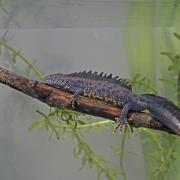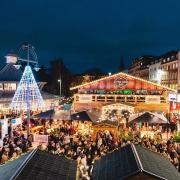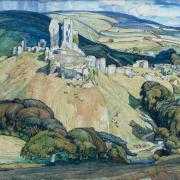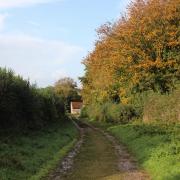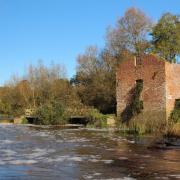February is a month of transitions; there are early signs of spring are such as drifts of snowdrops and increased birdsong as the courting begins. If your January blues are lingering, then a nature walk can boost your physical and mental health and will almost certainly lift your mood.
At RSPB Arne you might hear the uplifting song of the woodlark. A small streaky brown bird with pale eye stripe and a punky crest on its head, it is well camouflaged, so you are more likely to hear its beautiful lilting song than see this ground-nesting heathland bird.
As you walk around the RSPB Arne trails, you may also hear the distinctive loud ‘kronking’ sound of the raven. This highly intelligent member of the corvid family is best known for its connection to the Tower of London, where they are known as ‘Guardians of The Tower’. Legend says that the kingdom would fall if the six resident ravens, who are looked after by the Raven Master, were to leave the Tower.

Ravens are usually found in more rural areas, and they have been busy nest building with eggs being laid from February onwards. The attentive parents construct their large and messy nests high up in tall trees where they have good views of the surrounding area. Keep your eyes on the skies as they enjoy displaying their aerial, acrobatic prowess.
If you walk along one of the harbour edge trails at RSPB Arne, you might spot a peregrine falcon hunting. This bird of prey is impressively fast on the wing with recorded speeds of over 240mph, making them the fastest animal on the planet. At this time of year, they take advantage of the late winter gatherings of wading birds in Poole Harbour. Circling high above the wading flocks they wait for an opportunity to strike. Once in its sightlines, the peregrine plunges down at incredibly high-speed grabbing its prey of choice, often in mid-air, with razor sharp talons.

If you’re exploring heathland trails on a bright, sunny February day look out for basking adders, the UK’s only venomous snake. With the unmistakable black zig-zag markings on their back, adders take advantage of the sunny days as they emerge from hibernation. Look for bare ground facing a southerly direction and be patient. This is why it’s important to stay on the marked trails, and to keep dogs on short leads, to avoid disturbing reptiles and ground nesting birds.

Over in Weymouth, at RSPB Lodmoor, your nature walk could be rewarded with a starling murmuration. Arrive at the reserve just before sunset, then find a comfortable spot to wait for the show! At dusk, the starlings start to flock together forming incredible changing shapes, known as a murmuration, in the darkening sky before dropping suddenly into the reed beds or trees to roost. These ever-changing shapes as they flock is a way of confusing predators such as the peregrine falcon. Though there is no guarantee of seeing a murmuration, it’s worth a try as it is a remarkable event to experience.
Next month we take you behind the scenes of BBC Winterwatch which returns to RSPB Arne this January. Find out which species the presenters loved best from our special nature reserve. Keep up to date with our BBC Winterwatch news at facebook.com/RSPBDorsetReserves/
Half Term Activities
During half-term we will be offering nest box building workshops at RSPB Arne throughout the week, and at RSPB Radipole Lake Discovery Centre, Weymouth at the weekend. The low ropes children’s play area at RSPB Arne is also an ideal place for youngsters to burn off some energy.
Full info and booking for our events here: events.rspb.org.uk/arne






